Israel-Hamas War: What happened on day 103?
Hostage's mother accuses IDF of poisoning son to death inside tunnel • Medicine en route to Gaza hostages, undergoing IDF inspection at crossing
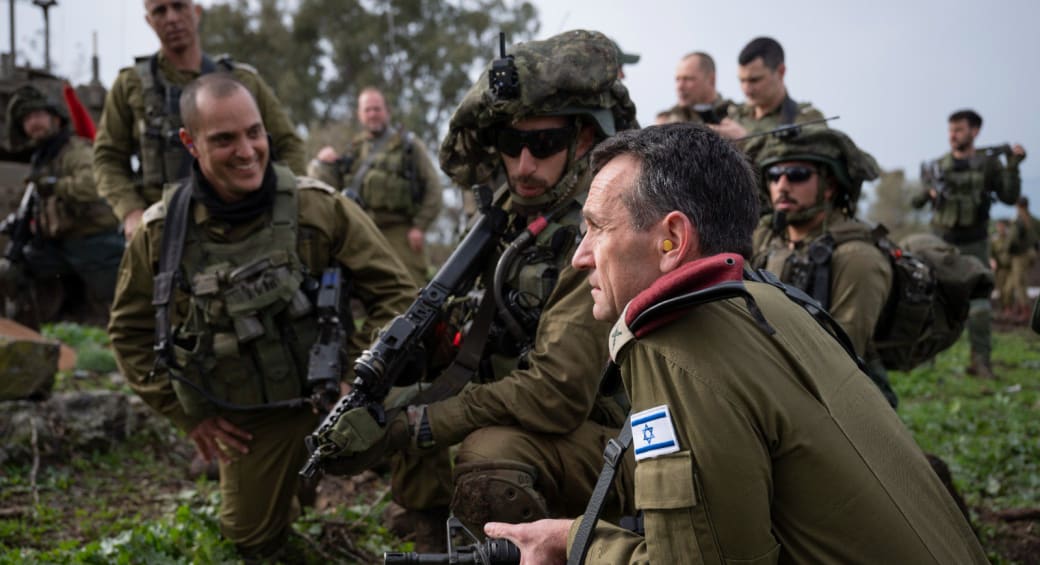

Netanyahu delayed new Gaza hostage deal, left war cabinet in the dark - report
According to reports, the ministers involved in the discussions found out about this later, and some of them even confronted the government to express their anger.
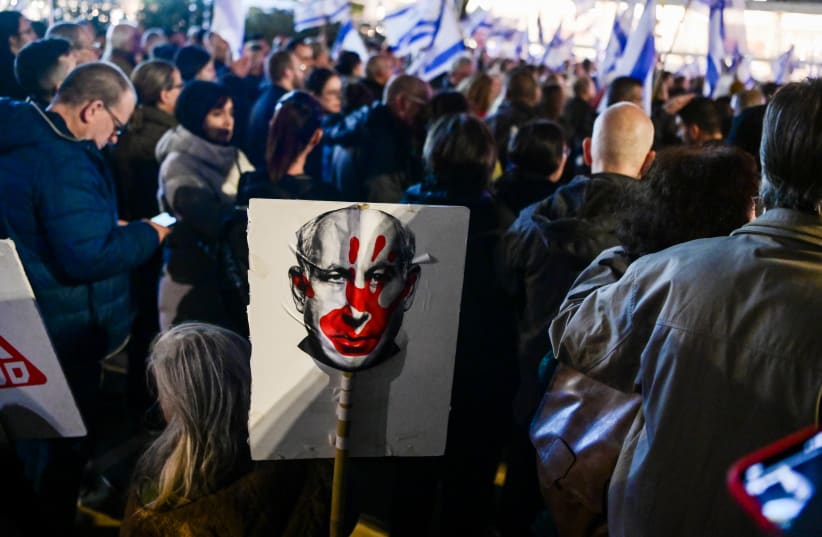
Prime Minister Benjamin Netanyahu unilaterally delayed and backtracked on agreed-upon outlines for the release of hostages without consulting the cabinet, according to Israeli media sources on Wednesday.
In recent days, the political leadership in Israel discussed potential conditions for a new and proactive negotiation that could eventually lead to a hostage deal. The negotiations were expected to be pushed forward by a mediator.
However, Prime Minister Binyamin Netanyahu delayed the talks and increased the demands that had been agreed upon, according to reports.
Discussions over the conditions were held with political echelon leaders, namely Defense Minister Yoav Gallant and Ministers Benny Gantz and Gadi Eisenkot. These discussions eventually brought about agreed-upon conditions that would guide the advancement of negotiations, which would later lead to a deal with Hamas when the political leadership had already reached conclusions about what Israel could give as part of that deal.
Without any warning
However, a few days after the conclusion of discussions in the war cabinet, and after the conditions that would guide Israel in the current course of action were agreed upon, Netanyahu delayed the outline and increased the demands without coordinating with the ministers of the war cabinet.
According to reports, the ministers involved in the discussions found out about this later, and some of them even confronted the prime minister to express their anger.
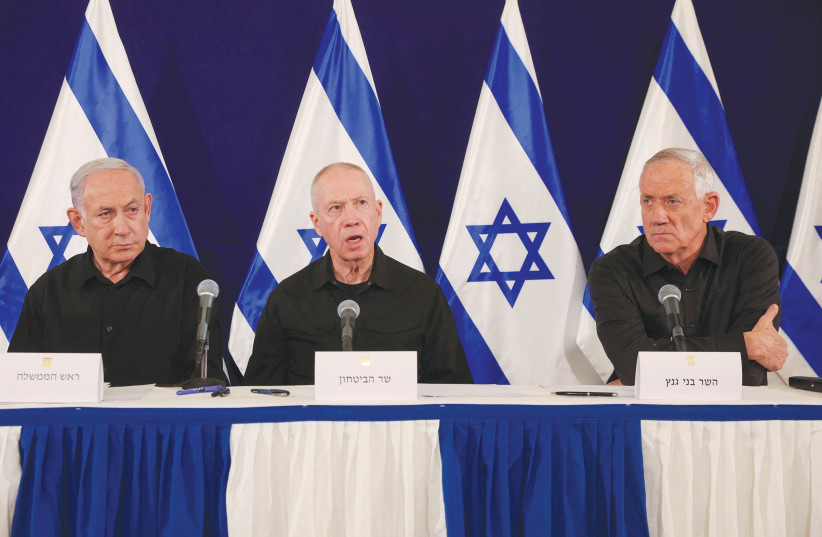
Sources within the government said that Netanyahu is "missing out on an opportunity to advance a hostage release deal."
On the other hand, political sources said that "they are still working on an Israeli outline; It has not been stopped."
Go to the full article >>More people likely to die of hunger than war in Gaza - Palestine Investment Fund
More people in Gaza are likely to die of hunger and famine than war, Palestine Investment Fund chairman Mohammed Mustafa said on Wednesday at the World Economic Forum.
The first steps should be to bring food, medicine, water and electricity back to the besieged enclave, he said.
Go to the full article >>Iran says it shared intelligence on Mossad with Iraq
Iranian Foreign Minister Hossein Amirabdollahian said on Wednesday that Tehran shared intelligence with Iraq about what it said were activities of the Israeli intelligence agency Mossad in the Iraq's semi-autonomous Kurdish region.
Iran has said its Revolutionary Guards attacked Israel's "spy HQ" in Iraq in the city of Erbil on Monday. Iraq later denied that there was any such spy centre in the country.
Go to the full article >>Netanyahu blames IDF for trucks entering Gaza without inspection
Channel 13 reported an Israeli official as saying that the trucks indeed did not go through "meticulous" examination, confirming a claim made by a senior Hamas official.
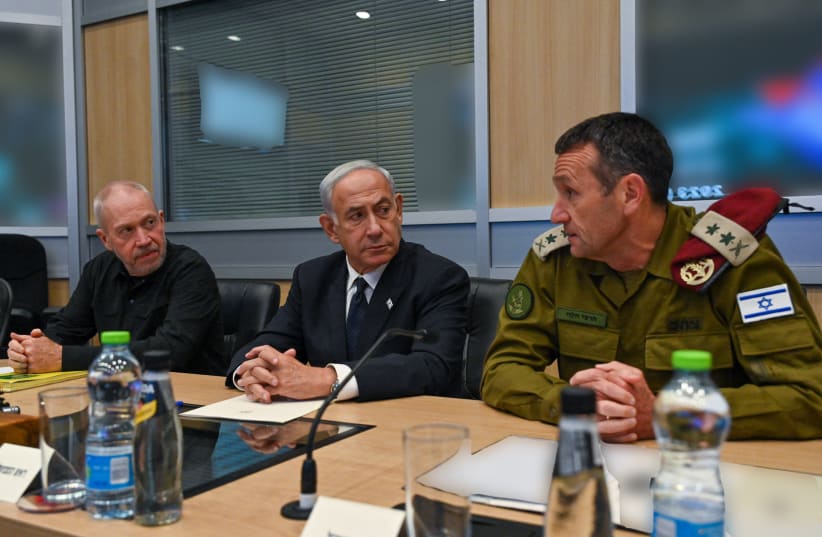
Prime Minister Benjamin Netanyahu evaded responsibility over the revelation on Wednesday that trucks carrying medicine and other supplies into Gaza, as part of a deal to get medicine to Israel's hostages, had not been examined first by Israeli security forces.
Channel 13 reported an Israeli official as saying that the trucks indeed did not go through "meticulous" examination, confirming a claim made by a senior Hamas official, Musa Abu Marzouk, on his X account.
"The prime minister ordered the passing of medicine to the hostages but was not involved in the arrangement of their examination, which is set by the IDF and security forces," the Prime Minister's Office said in a statement.
Opponents of Netanyahu immediately criticized him.
Gantz blasts Netanyahu: Decisions rests on us
"Inserting the medicine to our hostages is a significant and important move that we worked hard to achieve," Minister-without-portfolio and war cabinet member MK Benny Gantz countered. "The responsibility for the decision, as well as its realization, is on the political echelon – and only on it," Gantz said.
Yisrael Beytenu chairman MK Avigdor Liberman wrote on X, "Bibi (Netanyahu), enough with the bullshit. "It is time to start taking responsibility instead of passing it on everywhere, and stop making decisions only based on political considerations."

National Security Minister MK Itamar Ben-Gvir soon joined in the criticism.
"Mr. Prime Minister, stop being dragged after Gantz and stop the wisecracking. Perhaps the technical examination procedure is the responsibility of the IDF and the security forces, but the responsibility for ensuring that the trucks that are supposed to carry medicine to the hostages do not include ammunition and equipment for Hamas - is yours, and the small (war) cabinets' responsibility," Ben-Gvir wrote.
"If the trucks have not yet entered, simply direct the IDF and security forces not to allow them to enter without an inspection. This is definitely your responsibility and authority. Medicine for hostages – of course. Oxygen for Hamas for the continuation of the war – insanity," the national security minister concluded.
Go to the full article >>Will Houthi attacks in Red Sea disrupt nascent peace process in Yemen?
Although the warring sides agreed to a draft peace roadmap to end Yemen's civil war, Houthi attacks on ships in the Red Sea and US-UK airstrikes have analysts asking if the peace plan will go ahead.
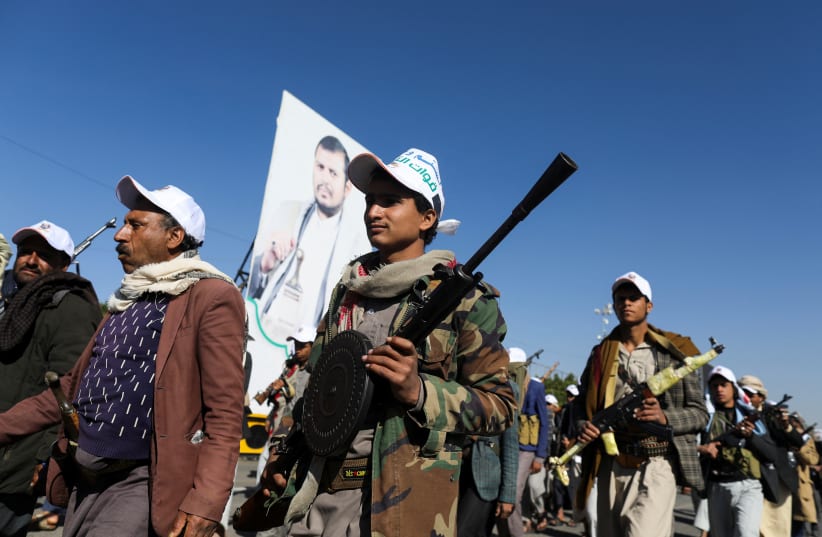
After nine years of brutal civil war, Yemenis are hopeful that they may be on the cusp of a return to peace following the announcement by the UN envoy to Yemen, Hans Grundberg, in late December that the warring sides had reached a draft agreement for a UN-led peace process.
Exclusive media sources for The Media Line said the final sessions to discuss the peace roadmap are scheduled to be held during the next three months in Saudi Arabia.
However, the United States and United Kingdom have since launched a series of airstrikes on targets in Yemeni cities that they say belong to the Houthi rebel forces.
This followed a UN Security Council resolution condemning the Houthi attacks on commercial ships in the Red Sea.
Houthi leaders have said the strikes will not deter them from continuing their operations in the Red Sea and that the US, UK, and every other country that participated in the attacks will be among their future targets.
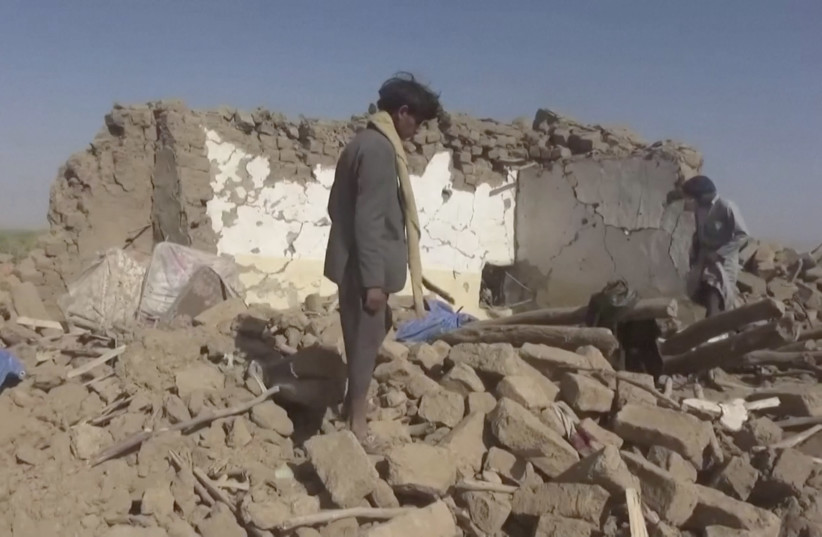
Some say the US-UK strikes threaten the Yemeni peace process. Others say the peace process will stop the group’s threats in the Red Sea.
“The peace roadmap dictates stopping all military operations across Yemen, land, sea, and air, which implicitly means stopping Houthi attacks in the Red Sea,” journalist and political activist Abdul Rahman Anis told The Media Line.
The Houthi attacks pose a clear threat to the global shipping trade, about 12% of which passes through the Red Sea, and have prompted several countries to establish an alliance to protect commercial ships.
Saudi Arabia is refusing to get involved
Saudi Arabia is refusing to participate in any military alliance against the Houthi operations in the Red Sea, and is also refusing to enter into any new confrontation with the Houthis, despite the Houthis having attacked Saudi oil installations and airports during the war.
“The kingdom fears classifying the Houthis as a terrorist organization or launching a military strike against them at the present time, which would mean negotiations failure and returning to square one, which is what the kingdom does not want, because it is focusing on concluding its negotiations with Yemen,” political researcher Abdul Salam Muhammad told The Media Line.
“There are other reasons for Saudi Arabia and the countries of the region not to participate in attacks against the Houthis," he said.
Political writer Khaled Salman told The Media Line that the Houthis are taking shelter in the roadmap and coming peace agreement with Saudi Arabia, “which will postpone any real military operation against them [the Houthis] by America and its allies.”
"Saudi Arabia has pressed with all its political might to cancel any attack against the Houthis, but the continuing threat to security in the Red Sea is stronger than the kingdom’s pressure,” he said.
“The public’s political anger is rising against the Houthis, especially with the possibility of canceling the expected peace [process] due to the attacks in the Red Sea.”
Salman said that the Houthis must remove obstacles and accept this “historic opportunity” to restore peace to the region.
The draft roadmap for peace in Yemen stipulates stopping all military operations in Yemen, paying public sector employees’ salaries, starting to export oil, and entering into a comprehensive political process.
The Houthis have been attacking ships in the Red Sea since after the Israel-Hamas war began on Oct. 7, saying that they were acting in support of the Palestinians. After the US-led airstrikes on seven Yemeni cities, Houthi leaders declared that a military confrontation with the United States has begun. At the same time, reports say that Iranian warships have been arriving in the Red Sea, and the Houthis have been obtaining Iranian weapons.
Maher Al-Khaled, a journalist affiliated with the Houthis, told The Media Line that many media reports say that the weapons and military hardware used by the Houthis were sent by Iran.
“The truth is that these weapons are nationally manufactured and there is an exchange of knowledge only with Tehran,” he said. “All weapons, including drones, naval boats, advanced cruise missiles, and others, were completely manufactured in the military production unit of the Yemeni army."
Many Yemeni observers would dispute this, as most reports and weapons seizures indicate that the Houthis have received military equipment from Iran.
Journalist and political writer Saddam Al-Huraibi told The Media Line that some of the Houthis’ arsenal, in particular their ballistic and cruise missiles, came from weapons seized from the Yemeni army after the Houthis took over the city of Sana’a in 2014.
However, "modern technologies for drones, boats, and sea mines come from Tehran, which is confirmed by the names of the similar names of aircrafts and similar types of technologies to those used by Iran,” he said. “The Houthis receive smuggled parts and small components by sea and then reassemble and manufacture these components into weapons.”
Go to the full article >>Do not allow Palestinian workers into Israel, Likud MKs and ministers demand
Some 90,000 Palestinian workers from the West Bank are employed in Israel.
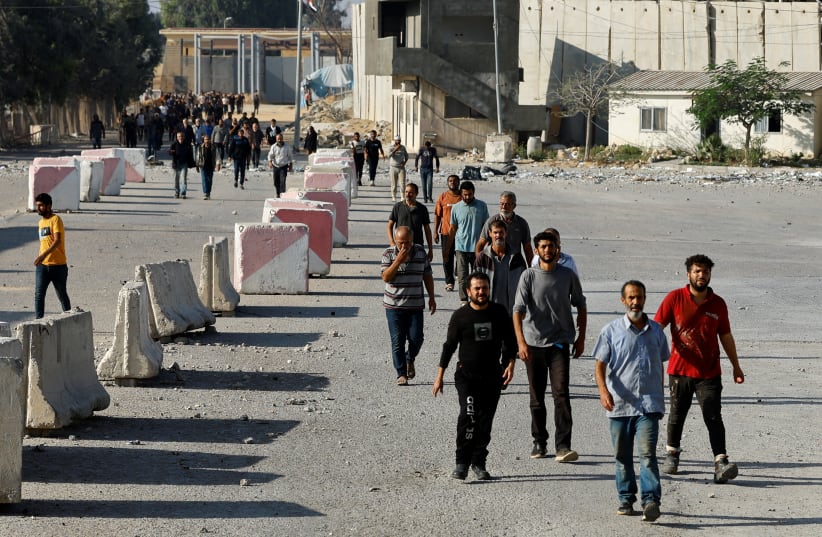
The Likud's ministers in the government should not support any decision to allow Palestinian workers from the West Bank into Israel, 12 Likud Members of Knesset (MKs) and two ministers wrote in a petition addressed to the other ministers of the Likud on Wednesday.
The petition followed an admission by Prime Minister Benjamin Netanyahu on Saturday that Israel was considering a pilot program for the entry of Palestinian workers aged 45 and older, and after Defense Minister Yoav Gallant warned this week that not allowing Palestinians to work in Israel would strengthen Hamas in the West Bank and ultimately lead to a deterioration in the security situation.
Walla reported earlier this week that the Population and Immigration Authority was examining a proposal from the head of the Contractors Association, Eran Siv, for a personal file for each worker intending to come to Israel. The intention is to facilitate the entry of older Palestinian workers with a clean security record in Israel who have been working in Israel for years.
"Since the beginning of the war on October 7, central sectors of the economy have frozen due to their dependence on workers from Judea and Samaria and Gaza," the petition began. "The required quota (of workers) for the economy can be filled by agreements with a number of countries, in which there are thousands of workers interested in working in Israel."
Gov't is 'tarrying' from doing so
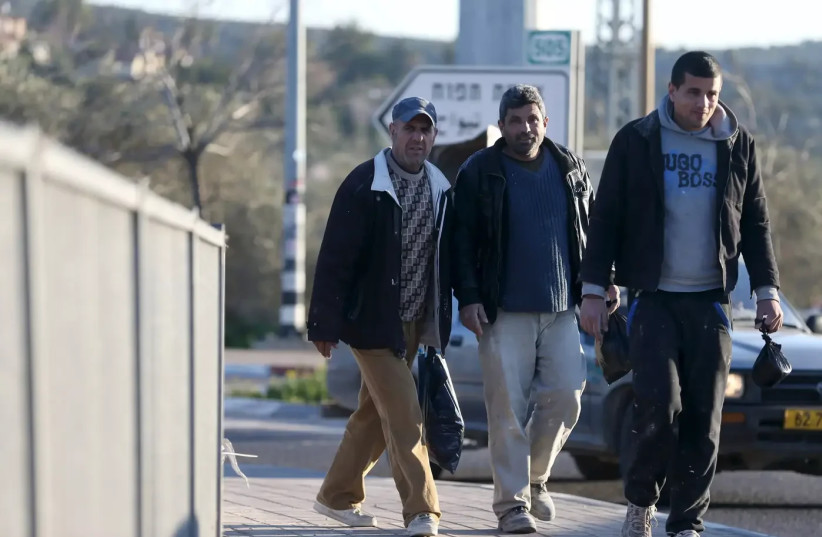
However, the government is "tarrying" from doing so, and every day that the sectors return frozen cost the state NIS 3.1 billion, the petitioners claimed, based on what they said was data from the finance ministry.
"In parallel, there is talk in the government of returning tens of thousands of Palestinian workers into Israel, as if October 7 never happened," and despite what they claimed were 83% of Palestinians in the West Bank who supported Hamas' October 7 massacre.
"It is not clear how the government of Israel wishes to run a 'pilot' on the security of its citizens? Should we enter Palestinian workers and see if they are murderers? Have we learned nothing?" the MKs and ministers wrote.
The question of the reentry of Palestinian workers has divided politicians in both the coalition and opposition - and even within political parties themselves - for weeks, as the MKs from the Likud who signed the petition – as well as MKs from the far-right Religious Zionism and Otzma Yehudit parties – have argued that despite preemptive screening by the Shin Bet, these workers could pose a security risk and provide information for future attacks against Israel.
In the opposition, MKs from the right-wing Yisrael Beytenu party and even some MKs from the centrist Yesh Atid party have argued against bringing Palestinian workers back, while others from Yesh Atid, Labor, and the two Israeli-Arab parties – Ra'am and Hadash-Ta'al – support the move.
Despite the fact that the petition was addressed to the Likud's ministers, two of the signers were Likud ministers themselves: Economy Minister Nir Barkat, and Diaspora and Combating Antisemitism Minister Amichai Chikli. There are 16 other Likud ministers, including Netanyahu and Barkat.
Barkat is a leading candidate to run for the head of Likud should Netanyahu step down or be removed from office, and has consistently criticized the prime minister and defense ministers' handling of the war.
"Gallant lives in the mistaken conception of October 6. It is sad to see that Gallant still believes that distributing money to the Palestinians will buy us quiet from terrorism," Barkat said in a statement earlier this week. "It is not Israel's job to find employment for Palestinian workers … what was will not repeat itself," he added.
The economy minister repeated his claim following the ramming and stabbing attack in Ra'anana on Monday.
One of the MKs who signed the petition, Dan Illouz, added on Wednesday that "the October 7th massacre, facilitated by Palestinian workers from Gaza using their work permits, is a harsh lesson against underestimating extremist threats. This tragedy has shattered the illusion that boosting the Palestinian economy will lead to peace. The reality is that these terrorists are driven by a Nazi-like ideology of hate, not economic hardship."
"Israel must now act decisively.," Illouz said. "We should stop the entry of Palestinian workers from Judea and Samaria, as their support for such atrocities signifies a clear danger. Our nation is not responsible for Palestinian livelihoods; they should develop their own economy. For our labor needs, global alternatives exist but we just need to signal these are not just temporary solutions. "
Some 90,000 Palestinian workers from the West Bank are employed in Israel. In contrast to what is happening in areas within the Green Line, some of the Palestinian workers who worked in the territories of Judea and Samaria, approximately 8,000 people, have been returned to their jobs in industrial areas such as Barkan, Mishor Adumim, and large settlements like Ariel. Security procedures for their work have been approved.
Ofer Petersburg contributed to this report.
Go to the full article >>IDF reservist wounded during overnight IDF operation in Tulkarm

An IDF reservist was wounded during an overnight operation in Tulkarm when terrorists threw explosives and began shooting at IDF forces, according to an IDF statement.
The reservist was seriously wounded after being hit by gunfire. The soldier was taken to hospital for medical treatment, and his family has been notified.
During the operation, the IDF, Shin Bet, and Border Police arrested 26 wanted terrorists in the West Bank.
The IDF searched buildings and interrogated dozens of suspects. They were also able to uncover dozens of explosives that were buried under the roads that were intended to harm the soldiers.
Go to the full article >>India holding talks with Iran about Red Sea attacks - government source

India is engaged in diplomatic negotiations with Iran on the attacks on ships in the Red Sea by the Tehran-backed Houthi movement, an Indian government source said on Wednesday.
India's foreign minister was in Iran this week to hold talks with his counterpart and said on Monday the discussions touched on the Red Sea situation, where the attacks have disrupted shipping on the global trade route.
The source, who requested anonymity, said the finance ministry's banking division would also make it easier for exporters affected by the disruption to get credit.
Go to the full article >>Netanyahu: Hamas war could continue into 2025

Prime Minister Benjamin Netanyahu said that according to recent assessments of the ongoing Hamas war, the conflict could continue into 2025, N12 reported on Wednesday.
Netanyahu said this while speaking with heads of the authorities of the Gaza border communities.
Go to the full article >>Blinken: Jewish lives don’t matter more than Palestinian ones
In an interview with journalist Thomas Friedman, Blinken discusses the war in Gaza, US humanitarian aid efforts, and the two-state solution.
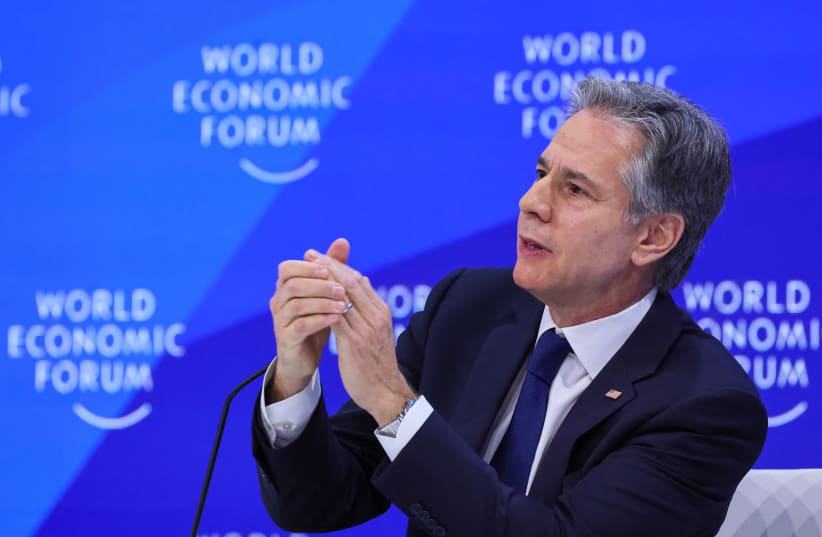
Palestinian lives are as important as Jewish ones, US Secretary of State Antony Blinken issued the World Economic Forum at Davos, Switzerland, when quizzed on the matter by veteran journalist Thomas Friedman.
“Do Jewish lives matter more than Palestinian and Muslim and Christian lives, given the incredible asymmetry in [civilian] casualties” in the Gaza war, Friedman said.
Blinken quickly replied: “No.”
He then expanded on the answer, stressing that “for me and for so many of us, what we are seeing every single day in Gaza is gut-wrenching. The suffering we are seeing among innocent men and children breaks my heart. The question is, what is to be done.”
US efforts to provide aid to Gazans
The Biden administration has been harshly criticized for not forcing Israel to halt the Gaza war in light of Hamas assertions that over 24,000 Palestinians have been killed in Gaza war-related violence. Israel has claimed that 9,000 of those fatalities have been combatants.

Blinken spoke of US efforts to reduce Palestinian casualties and increase humanitarian assistance to Gaza. “But that in no way, shape, or form takes away from the tragedy we have seen and continue to see. All I can tell you on a purely human level, it is devastating, but it reinforces the conviction to do everything we can in this moment to try and make a difference in the day and day out” as well as to arrive at a larger resolution for Israel’s conflict with the Palestinians the Middle East.
“There has to be another way that answers Israel’s most profound concerns and questions,” Blinken said.
Israel can’t allow for another attack like the one executed against it by Hamas, Blinken said, as he referenced the incident sparked the Gaza war in which 1,200 people were killed in southern Israel, and another 250 were seized as hostages.
“It’s hard to overstate the psychological impact on the country as a whole of what happened on that day,” he said.
Outside of Israel, there are large portions of the international community that do not believe that October 7 happened, “that Hamas slaughtered men, women, and children, that it executed parents in front of their kids, that it executed kids in front of their parents, that it burned families alive. They do not believe it,” Blinken said.
Challenges in creating a two-state solution
The biggest challenge is dehumanization, “the inability to see the humanity in the other,” and when that happens, “you get so hardened that you're willing to do and accept things that you wouldn’t if the humanity of the other was front and center in your consciousness,” Blinken said.
What is needed is leaders who understand this and are prepared to act on it, he stated.
He spoke of the importance of that leadership in preparing Palestinian, Arab, and Israeli society for a regional resolution that would lead to peace, such as Israeli normalization, including with Saudi Arabia and Palestinian statehood.
“When in previous times we came close to resolving the Palestinian question, getting a Palestinian state, the view then, Camp David, other places, was that Arab leaders, Palestinians leaders had not done enough to prepare their own people for this profound change,” Blinken said on Thursday.
Now, one also has to ask if “Israeli society prepared to engage on these questions, is it prepared to have that mindset, that is challenging,” Blinken explained.
“It is doubly challenging when you are focused intently on Gaza and all the security questions that are the day-in and day-out life for Israelis and Palestinians alike,” he stated.
The US administration has been clear, including in Davos, that it is pursuing Israeli regional normalization, including with Saudi Arabia, alongside a pathway to Palestinian statehood.
“You now have something that you did not have before, and that is, Arab countries and Muslim countries, even beyond the region, that are prepared to have a relationship with Israel in terms of its integration, its normalization, its security that they were never prepared to have before,” Blinken said.
“But you have an absolute conviction by those countries, one that we share, that this has to include a pathway to a Palestinian state,” he said.
To that end as well, there has to be a stronger and reformed Palestinian Authority, Blinken stressed.
The challenge is getting to the point where these opportunities can be actualized, Blinken said, adding that he believed that this new reality of Middle East regional normalization with Israel and Palestinian statehood must happen now.
“We are in the midst of human tragedy in so many ways. … for Israelis and Palestinians alike, I feel the fierce urgency of now. Seeing if we can start the move to this different vision, to this different equation, to this different integration that has to begin as quickly possible,” Blinken said.
Israel-Hamas War: What you need to know
- Hamas launched a massive attack on October 7, with thousands of terrorists infiltrating from the Gaza border and taking some 240 hostages into Gaza
- Over 1,200 Israelis and foreign nationals were murdered, including over 350 in the Re'im music festival and hundreds of Israeli civilians across Gaza border communities
- 136 hostages remain in Gaza, IDF says